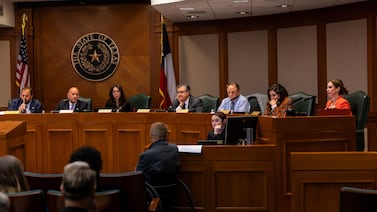A version of this post was originally distributed in Votebeat’s weekly newsletter. Sign up here.
Dominion’s various defamation lawsuits tilted slightly in its favor this week — at least in the public eye. That’s because a 14-page memo indicating that Trump’s team knew just a week after the 2020 election that their claims about Dominion Voting Systems were false has now been published and submitted as part of the Colorado company’s case. Still, Trump’s personal attorney and members of his campaign continued to make these claims, and made them repeatedly. I’m not a lawyer, but that seems like a crucial finding for a defamation case.
The memo appears to have been hastily collected, is riddled with typos, and was produced with minimal research. But even in that format, it made two significant facts clear: Dominion is not in any way associated with Venezuela, and Eric Coomer — the Dominion employee Trump had accused of being part of antifa — was not part of antifa and did not manipulate any machines.
It’s become easy to lose sight of people like Coomer, who was at the time Dominion’s director of product strategy and security. The individuals whose lives have been overtaken by this madness have been overshadowed by the madness itself. But we should keep staring right at the human damage: Coomer was a real person whose life as he knew it was destroyed by misinformation and lies that Trump and his team knew to be false at the time they said them. And they kept saying those same things for months, and some continue to say them today.
The memo, the existence of which was revealed by the New York Times, was first circulated among Trump’s inner circle in mid-November, a week after the election and only a few days after Dominion conspiracies first began to circulate. A communications staffer called for the memo because he wanted to know once and for all if the rumors were true. The NYT article does not determine whether Rudy Giuliani or Sidney Powell saw the memo, and Giuliani claims not to have seen it. Among the memo’s takeaways: “Dominion has not [sic] direct ties to Venezuela,” and “There is no evidence that Dominion’s CEO or any other leader of the group has ties to ANTIFA.” Specifically, “There is no evidence Coomer is a member or has any ties to Antifa.”
Still, almost a week after the memo, Powell and Giuliani took the stage at RNC headquarters to announce that Dominion was under “massive influence of communism,” and Coomer, specifically, was a “vicious, vicious man.” During this time, Eric Trump tweeted about Coomer by name, accusing him, specifically, of rigging the election. An excellent New York Times Magazine profile of Coomer says he went into hiding, arming himself. At one point he left the country. His family was threatened. He reached a settlement with Dominion and left his job. He doesn’t expect to work in elections again.
He filed a lawsuit against Trump, Powell, Giuliani, and a slew of conservative news organizations in late December. It was the first such lawsuit resulting from the stolen-election fiction, and it pre-dated Dominion’s lawsuits. Newsmax has retracted its claims about Coomer and apologized, but he’s right: Regardless of the outcome of this suit, he’ll probably never work in elections again.
And he’s not the only person whose life has been significantly altered by the conspiracy theories circulating about Dominion. On Dec. 1, two weeks after the memo, the Georgia secretary of state’s chief operating officer, Gabriel Sterling, made national headlines when he implored his fellow Republicans to end the madness. He asked them to “stop inspiring people to commit potential acts of violence,” warning that “someone’s gonna get hurt, someone’s gonna get shot, someone’s gonna get killed, and it’s not right.”
A Dominion contractor in the state had been subjected to a deluge of harassment. “There’s a noose out there with his name on it,” Sterling told reporters. “And it’s not right. I’ve got police protection outside my house. Fine. You know, I took a higher-profile job. I get it. [The] secretary ran for office, his wife knew that, too. This kid took a job. He just took a job, and it’s just wrong.”
And this lie has spurred the harassment of other individuals across the country, too. Most notably in Arizona, where on Friday, Cyber Ninjas finally released its report about its months-long “forensic audit.” Surprisingly, it affirms that Maricopa County’s ballot counts were accurate (even as it raises thinly supported concerns and critiques of the county’s election performance). The millions of dollars spent on the effort, the thousands of voters who became convinced the system is rigged, and the machines that had to be decertified were all sacrificed along the way. And they weren’t the only thing sacrificed along the way: Maricopa County officials have been repeatedly threatened. In the chaos around this audit, it’s easy to forget about these people.
The audit’s origins were ridiculous to begin with, as made evident by the Trump campaign’s memo. That Cyber Ninjas got the job at all was a result of the repeated false information about Dominion spread by the Trump campaign. The CEO of Cyber Ninjas had risen to popularity among Arizona’s Republican leaders specifically because he backed the theory. In a document he authored, published by Powell in January, he wrote, “the core software utilized by Dominion … originates from intellectual property of Smartmatic.” This is false, and the campaign’s November memo specifically indicated this was false. Logan’s document also claimed that Dominion had manipulated the results of the 2020 election.
It was on this basis that Arizona Republicans successfully demanded the turnover of more than 2 million ballots and the Dominion machines that had counted them. Those machines have now been decertified because of Cyber Ninjas’ failure to transparently articulate what it would be doing with them or maintain appropriate chain of custody, costing taxpayers millions. Taxpayers will likely spend millions more paying for years of voter education that will be necessary to undo all of this damage.
I’ve repeatedly tweeted about how I hate the term “The Big Lie.” It’s an oversimplification of a far more complicated view of what’s happening: It’s not one big lie. It’s a lot of big lies, woven together to create a full, completely false narrative. The lie is not simply “the election was stolen.” It is a rope of smaller, woven tales: Eric Coomer is part of Antifa; Dominion’s software was created in Venezuela; the company has ties to Hugo Chavez; Maricopa County election officials are secret Democrats.
As these lawsuits drag on and discovery continues, more evidence will likely surface showing that, all along, the people spouting these lies and exaggerations knew what they were saying was wrong. Hopefully one day the rope will fray and snap, but right now it’s still holding strong. And we’re losing good election workers the longer it stays taut.
Back Then
The voting machine market is poorly studied given its lack of transparency, but what little data exists shows that Dominion grew from a basically unknown player in the United States to the second largest provider of machines in the country in the last decade and change. Its growth in popularity was due to another chaotic election: 2000. It all seems to come back to that one, doesn’t it? Electronic voting systems came into fashion after the hanging chad debacle of that year, but by 2004 people were already growing suspicious. In Broward County, Florida, unexpected election results that year with no auditable paper backup shot eyebrows up through the roof. Dominion machines, by contrast, continued to provide the ease and convenience of electronic voting with the security of paper backups, and were snapped up by counties across the country as a more secure alternative to fully electronic voting systems. Going from being the secure option to the stuff of conspiracy fever dreams stoked by conservative media is quite the surreal twist.
In Other Voting News
- Only hours after Trump asked him to, Greg Abbott ordered a “full and comprehensive forensic audit” of the 2020 election results in four of the state’s largest counties: Dallas, Harris, Tarrant, and Collin. The secretary of state’s office has said these counties were chosen because they are the state’s largest Democratic and Republican counties, respectively. While the SOS’s statement indicated it “anticipated” the legislature would fund the audit, no funding has yet been provided.
- USA Today has a great explainer (Truly! Excellent detail.) that fully debunks a sneaky bit of misinformation in the California recall: That 70 percent of voters at some polling places were told they’d already cast ballots when they showed up to vote. That’s false, and one of many pieces of false information that circulated in the weeks before the recall.
- We don’t really know what he thought was going to happen, but after John Merrill — Alabama’s Secretary of State — apparently willingly welcomed MyPillow CEO Mike Lindell to visit Alabama, Lindell accused unknown cybercriminals of having “flipped” 100,000 votes in the state. Merrill, of course, disputes this. But, he did invite the man. We don’t have a “bad idea of the week” section on this newsletter, but if we did, this would be the whole section.
- In a classic bit of word-twisting, right-wing social media has clasped onto a Utah election official’s offhand comment about “2,000 people” showing up to a meeting and are using it to fuel their demand for an audit. These folks are claiming that if 2,000 people do show up, the official will have to call for an audit. Of course, she said no such thing. We’ll see what happens.
- An audit in a New Hampshire county, probing some irregularities in a 2020 state legislative race, has produced a surprisingly detailed and nuanced debate about election policy. Reporter Casey McDermott has a great writeup here for New Hampshire Public Radio.
- Missouri Secretary of State Jay Ashcroft is pushing for municipal elections, such as races for school boards and city councils, to become partisan affairs. It’s receiving pushback from local officials, who say these elections work fine just the way they are.
- Counties in Florida continue to battle against the Voter Participation Center and the Center for Voter Information, which have repeatedly sent out misleading mailers to all sorts of people — voters, dogs, cats, dead people — indicating they should register to vote. Electionland covered this sneaky phenomenon (which results in a flood of angry calls to county offices every single time it happens) last year. Clearly, little has changed.
- Iowa Secretary of State Republican Paul Pate is sending out 50,000 postcards to Iowans who are eligible to vote but are not registered. They will contain a QR code linked to the online voter registration site, along with instructions for how to register. The campaign is set to align with National Voter Registration Month, which is September!
Good Idea of the Week
This week, we bring you an unexpected good idea — call it a good example — resulting from a harrowing incident. Election administrators aren’t the only ones receiving threats and routine harassment. A local health official in Michigan emailed his board of commissioners asking for their help because a woman attempted to run his car off the road at high speed after he issued a mask mandate for his county’s schools.
“I need help,” Kent County Health Department director Adam London wrote. “My team and I are broken. I’m about done. I’ve done my job to the best of my ability. I’ve given just about everything to Kent County, and now I’ve given some more of my safety.” He said the motivating factor that spurred the insurrection on Jan. 6 was fueling the hate he and his family have been at the receiving end of as the pandemic has worn on.
He continued: “These are people who hope to force their views on others through intimidation, aggression, and their rhetoric suggests violence as well. I will not participate in witch trials in which the science I’ve presented, and the opinions of legitimate experts, is reduced to the same stage as people living in echo-chambers of junk science, salespeople, and Youtube videos. For the leaders of these misinformation campaigns, it’s never really been about our data; it’s been about their dogma.”
Why are we featuring this? London reported his threat and candidly described the hostilities and challenges he and his staff face — a move election administrators in similar situations should consider. He’s standing up for himself, seeking support, and demanding his government stand up for him too.






